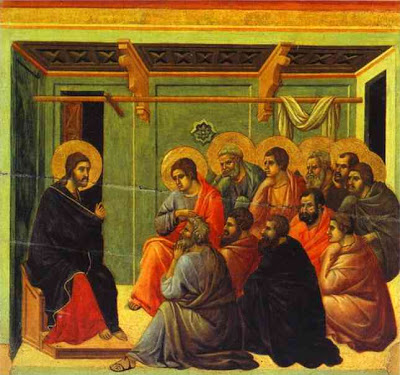William Wrede’s The Messianic Secret
Part 9: Concealment Despite Revelation
This unit continues with the section of Wrede’s The Messianic Secret (1971 English translation) from pp. 82 through 114, which focuses on the phenomenon of the disciples (and others) seeing or hearing the truth about Jesus but failing to understand that truth.

“Are you guys even paying attention?”
(Duccio di Buoninsegna)
Where MacDonald went wrong
Somewhat coincidentally, Neil recently posted a piece called “Where Wrede Went Wrong? MacDonald vs Wrede on Why Jesus Tried to Hide His Identity.” In it, he discussed Dennis MacDonald’s contention that the Gospel of Mark at least in part draws upon narrative motifs from the Odyssey, including the necessity of secrecy as the travel-weary protagonist plots to take revenge against “the Suitors.”
According to MacDonald (see Ancient Fiction and Early Christian Narrative), Wrede mistakenly placed the revelation of messiahship at the resurrection, when the actual revelation occurred earlier. He writes:
This understanding of secrecy [i.e., the one for which MacDonald is arguing] deviates from most other interpretations, including Wrede’s, by proposing that the disclosure of the secret takes place not at the empty tomb but at the Sanhedrin trial. (p. 142, emphasis mine)
While I am amenable to his proposal that Mark at times imitates Homer, MacDonald has failed to understand one of the enigmatic features of the messianic secret. For while self-concealment is a core component of the motif, Mark’s gospel also contains a number of instances in which the true identity of Jesus is plainly revealed to the people around him, and yet the secret remains intact.
By that I don’t mean that certain people “in the know” keep his secret. They hear all, but understand nothing. Only the demons seem to understand the full implications of the true nature of Jesus, and they weren’t told, but already knew it, owing to their supernatural existence.
MacDonald is correct about the disclosure of the secret at the Sanhedrin trial. In fact, from a narrative perspective, it is the turning point that inexorably sends Jesus down the path toward crucifixion. However, as we will see, this instance of disclosure resembles previous occurrences in that understanding does not follow revelation.
Scenes of recognition
The scene in the Odyssey in which Telemachus recognizes his father, MacDonald says, bears a strong resemblance to the scene in Mark wherein Peter “recognizes” that Jesus is the Christ. Interestingly, Telemachus first believes he is in the presence of a god and is frightened nearly out of his wits. At the close of both scenes, the protagonist orders silence. MacDonald writes:
Continue reading “Reading Wrede Again for the First Time (9)”
